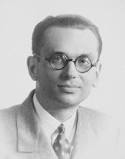Lifetime
Born: 28.04.1906Passed away: 14.01.1978
About
Born | April 28, 1906 |
Died | January 14, 1978 (aged 71) |
Residence | United States |
Citizenship | Austria, USA |
Fields | Mathematics, Mathematical logic |
Institutions | Institute for Advanced Study |
Alma mater | University of Vienna |
Doctoral advisor | Hans Hahn |
Known for | Gödel's incompleteness theorems, Gödel's completeness theorem, the consistency of the Continuum hypothesis with ZFC, Gödel metric, Gödel's ontological proof |
Notable awards | Albert Einstein Award (1951); National Medal of Science (USA) in Mathematical, Statistical, and Computational Sciences (1974) |
Gödel is best known for his two incompleteness theorems, published in 1931 when he was 25 years old, one year after finishing his doctorate at the University of Vienna. The more famous incompleteness theorem states that for any self-consistent recursive axiomatic system powerful enough to describe the arithmetic of the natural numbers (for example Peano arithmetic), there are true propositions about the naturals that cannot be proved from the axioms. To prove this theorem, Gödel developed a technique now known as Gödel numbering, which codes formal expressions as natural numbers.
He also showed that neither the axiom of choice nor the continuum hypothesis can be disproved from the accepted axioms of set theory, assuming these axioms are consistent. The former result opened the door for "working mathematicians" to assume the axiom of choice in their proofs. He also made important contributions to proof theory by clarifying the connections between classical logic, intuitionistic logic, and modal logic.
